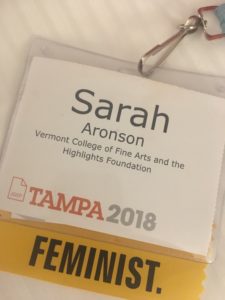
This week, I am writing from the AWP conference in Tampa, Florida. I have been looking forward to this conference for a long time, mostly because of my two panels: one about a topic I write about all the time: protecting your joyful, creative heart in an angry world full of distractions.
The other was a conversation I’ve been wanting to have for a long time: The Future of Kid Lit is Female.
Here was our blurb: Whether they are dismantling old tropes, solving crimes, seeking social justice, or leading armies into battle–whether their stories are humorous, satirical, or suspenseful–today’s female protagonists are offering diverse role models of what it is to be a feminist. The panel of writers of picture books to YA novels will examine their processes for uncovering these voices, ideas about responsibility to their readers, as well as possibilities for future books.
And then the nor’easter came. Three of our members couldn’t make it.
Here’s the first thing I want to say about women: It took less than an hour to find women who were ready to step in and contribute to this panel. This happens to me all the time. When a job needs to be done, women roll up our sleeves and do it. We support each other—no arm twisting needed. In a day, flights got changed. New panelists got prepared. We showed up. We worked.
No shock: the panel rocked!
Cynthia Leitich Smith, Kekla Magoon, Tricia Springstubb, Laura Shovan and I had 75 minutes to essentially begin a conversation. We started with talk about our first literary heroines as well as the monomyths and stereotypes we intentionally crushed in our work. We talked about how recent events have (or haven’t) made us more aware of our responsibility to create a wide variety of female characters (ie: not just “strong” but also funny, unlikeable, or diverse) , and how the industry needs racially, culturally and ethnically diverse women to write these books. And edit these books. And hopefully, find these books on the shelves or promote them.
We talked a lot about our world right now. And the future.
That included talk about sex. And fairy godmothers. And girl wrestlers. And girls who like trucks. Or have to stand up to authority.
And how we need even more kinds of girls in books.
We could have talked for hours. About professional obstacles and opportunities. About bias and change. About the challenges of creating authentic and flawed characters that sometimes, get everything they want.
Also about how we could get what we want.
And of course, we talked about great books by women that we couldn’t wait to read. (Stay tuned for my list!)
Here’s the second thing I want to say about women: When you start a conversation that makes sense, get ready for a lot of enthusiasm and participation.
At the panel and beyond, I met women who wanted to talk about the obstacles they faced, personally and professionally. At least ten times, women approached me to ask: What Can I Do? And say: I didn’t realize I was doing that, too. And mostly, I felt hope—as I always do when I am with a group of women that love books.
During the conference, I talked to women of all ages. One conversation stood out: When I was eating lunch the next day, an older woman pulled her walker up to my table. She said that she had attended the panel full of skepticism and fear. That she was expecting to feel guilty and shamed. When I asked her why, she told me she had children in the 60s and 70s and never felt available for women’s lib–that it had passed her by and now there was nothing she could do. But now she was ready. And she was mad. She was tired of waiting for women to have the same opportunities as men. She was sick of the rules and polite language that diminishes our accomplishments. She told me that our panel struck a chord. And that she wasn’t going back and hoped we wouldn’t either.
She wanted to call herself a feminist. But she had ONE FEAR LEFT: she wasn’t sure she could get used to “all these new pronouns.”
I assured her that by voicing this fear–she had already begun to conquer it. I also thanked her for sharing her fear with me. They don’t have much power when we start facing them together. Aloud.
The third thing I know about women: we know how to make a strong community.
This is the power of these conversations. Of community. Of working together. When this month is over, I hope that we don’t forget how much easier it is to be brave–to face the angry world–to write–to create–to take chances–to be honest–when we don’t have to be all those things alone. Our victories this month will be vast–only if we keep going.
Let’s keep this going.

This post made me happy! Thank you!
Thank you! I’d love to continue this conversation in Kansas! There is so much to unpack!
Poking my head up after being walloped by that nor’easter, Sarah. I FEEL this post and am grateful to you for your beautifully expressed points and positive energy.